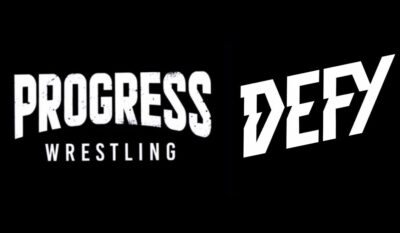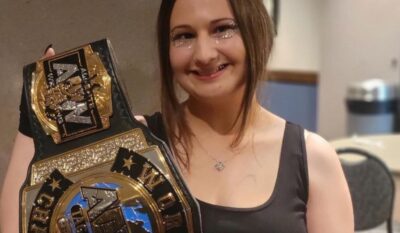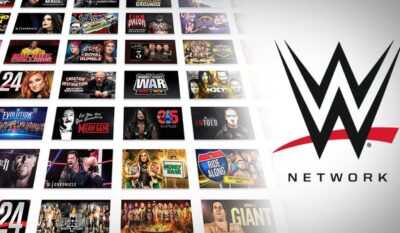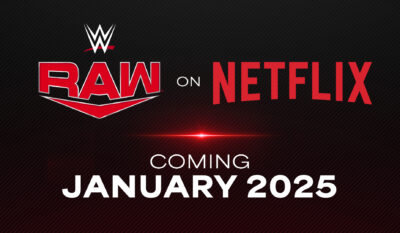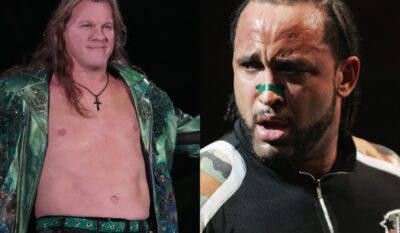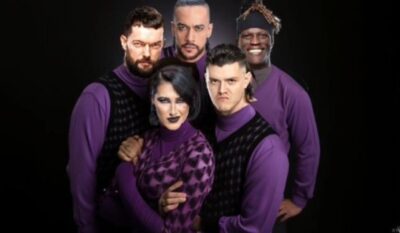Published on March 25, 2020
For many wrestling fans, it was a moment akin to “where were you when Kennedy was shot?”
On Monday 25th June, 2007, news broke that former World Heavyweight Champion Chris Benoit had been found dead, along with his wife Nancy and seven-year-old son Daniel at their home in Fayetteville, Georgia. In response, WWE would air a three-hour tribute episode of Monday Night Raw, where Benoit’s colleagues and friends would pay their respects. A day later and ‘the Crippler’ had been erased from company history, never to be mentioned officially again.
As anyone reading this knows, Benoit had in fact murdered Nancy and Daniel over the course of that late June weekend, before finally taking his own life on the Sunday, when he was due to be facing CM Punk for the vacant ECW Title at WWE’s Vengeance Pay-Per-View in Houston, Texas.

The story dominated the international press for days and weeks afterwards and has long been the subject of rampant, often divisive discussions and debates between wrestling fans and personalities. And while some of these conversations have been constructive, much of the discussion around the final 48 hours of Chris Benoit’s life has lacked the vital intricacies and details that such a complex case possesses, that often we never discover.
With the second season of their groundbreaking documentary series ‘Dark Side of The Ring’ on VICE TV, however, Evan Husney and Jason Eisener have used their platform to delve into pro-wrestling’s darkest hour, going in depth with those closest to Benoit, including Chris Jericho (who narrates the episode), Vickie and Chavo Guerrero – the wife and nephew of Benoit’s best friend, the late Eddie Guerrero – Nancy Benoit’s sister Sandra and Benoit’s other son David.
As you read this, the episode has just premiered on VICE in two parts and launches a second season which will traverse the various unspeakable corners of the murky world of professional wrestling, including the career of bounty hunter turned ECW cult hero New Jack, the cocaine and vaseline soaked life and death of Herb Abrams, Owen Hart’s tragic death at a WWE PPV, Dino Bravo’s gangland murder and, perhaps most excitingly…. the motherfucking Road Warriors.
Fortunately, we were able to score a few minutes with Evan late last week, just before the Benoit episode premiered to widespread acclaim, to discuss the new season in all it’s warped, tragic, badass glory.
Wrestling Travel: First of all, I’ve got to ask, how cool was it to recreate the Road Warriors Clash of Champions entrance?
Evan Husney: It was amazing. We just did it last week, we were able to get our last shoot in just before everything got shut down. If we were doing it this week, I don’t know if we would have been able to shoot it, so we snuck it in last minute. The Road Warriors have always been for me and Jason…we’ve just been Road Warriors fans our whole lives, so this is totally our fan out, mark out episode in many ways. So we were like, “if we’re doing the reenactments, that means we get the pads, right?” So of course we had to take some time in-between set ups to put on the pads and take a few snaps. I actually remember watching that Clash of Champions, and I think it was also used in a Starrcade, and seeing them come down those stairs and thinking it was such a beautiful set piece and instantaneously when planning the episode we were like “we need to have those stairs”, they look so badass. It’s like they’re de-boarding a spaceship or something, like they’re in Close Encounters… or something. We just had to incorporate that in some way, so I’m really happy it worked out.
From the very beginning, we always dreamed of recreating The Road Warriors entrance on the “Clash of the Champions” light-up steps ⚡️ pic.twitter.com/btIGxiNn2L
— Dark Side of the Ring (@DarkSideOfRing) March 12, 2020
There’s something about the magic of the Road Warriors as a team. They were never really tied down to one organisation and they just seemed to transcend that whole territory concept. They were almost like a travelling rock ’n’ roll band that would come into your town and tear it up. They’re probably some of the more identifiable wrestlers to non-wrestling fans in a lot of ways. They’re the most quintessential tag team, it feels like. Obviously you have other great tag teams like the Midnight Express but are they as visually recognisable? Are their silhouettes that iconic?
When the Road Warriors hit the ring, if you go back and watch the right tapes, of them coming to the ring to ‘Iron Man’ by Black Sabbath, especially in Japan, it was like the parting of the sea when they’re coming through these audiences. You can’t embody that level of badassness any more. It just doesn’t exist. The culture’s changed a lot. And there wasn’t even anything like them before, they were totally brand new. Here’s these post apocalyptic sci-fi warriors when a lot of other wrestlers looks liked Dads and Uncles coming to the ring, so it was like ‘Holy shit’ when the Road Warriors showed up. If you put them into the context of their time, there’s nothing else that’s comparable.
WT: The season premiere tackles the subject of Chris Benoit and his double murder-suicide. How do you anticipate wrestling fans will react to this episode, because even though everyone knows what happened, it feels like there’s so much more that has never been properly explored regarding the last 48 hours of Benoit’s life.
EH: It’s such a difficult, heavy story. I remember so clearly when the news broke originally 13 years ago and one of the main reasons we wanted to approach it was because it really did seem like a subject that hadn’t been processed or there hasn’t been a constructive conversation around it, there’s been stuff that’s been kept at a safe distance or swept under the rug for so many years. And I don’t know if in years prior it was the right time to have that conversation and it’s easier now because so many years have gone by, but that was the reason we wanted to approach it.
As we started talking to people, meeting them and doing the interviews you’ll see in the episode, you’ll notice that it’s a subject they wanted to talk and open up about to get off their chests because for whatever reasons they’ve been told for years not to or there’s not been a platform for that. So that’s when it became clear to us that this episode was about the family members, who are also victims too in this instance, having to still be here and having to deal with it, having lived through it.
Also friends and colleagues and those closest to the story, being able to talk about it and it being more about them, that was what our approach to the story was, not to sensationalise it in the way it’s been covered over and over again, let’s hear from the people that were as close to the story as possible.
WT: What were your own personal thoughts and opinions on Benoit before making this episode and have they changed since making the show?
EH: I wouldn’t say that my opinions changed much, because I was so focused on the stories of the people in the episode, but as a personal history, Chris Benoit was a wrestler that I followed in the nineties and, like a lot of people my age, was introduced to him through the Nintendo 64 games. I remember, so vividly, him being so entertaining to watch as a wrestler, as well as all his contemporaries; Dean Malenko, Eddie Guerrero, Rey Mysterio, Chris Jericho, those guys were leaps and bounds more entertaining than so many of the other guys in WCW to watch in the ring. So that was a huge part of my childhood, for sure. So when that story happened it was so monumentally devastating, it was almost incomprehensible. It was so wild.
Over the course of producing this show, it’s given us an insight into the complexities of trying to cope with it. Because I can’t imagine, trying to put myself in their shoes, if that happened to somebody that I knew, how would I process that? How to come to terms with that would be so incredibly difficult. So that was one of the things for us in the process of making it being like ‘wow’, for that to be your father, your brother-in-law, your closest friend, your colleague or whatever it is, it would be so hard to process that and that was one of the things, being so close and intimate with it as we’ve been over the last year, it was a very sobering thing to process, but at the same time, important to discuss versus not discussing it at all.
WT: Do you think the advent of discussion around CTE has made it easier for people to understand more of the intricacies surrounding the Benoit story?
EH: Yes I do. I’m not a scientist or a neurologist or anything like that, but I do think the Chris Benoit case is a complex one and, I hope our episode achieves this, you can’t just point your finger at one thing and say ‘this is why…’, which makes it extra difficult. I think it’s a confluence of different things that was going on in his life at the time and obviously CTE plays a role there.
I also think Mental Health plays a huge role and I don’t mean that in just a head injury way but in an emotional way, because you definitely see that unfolding in our episode in terms of that side of things. And when you combine that with drugs and alcohol and other things and also maybe a little bit of a past of some domestic situations and you put all that together, it creates, not necessarily a clear picture, but a confluence of a lot of different factors. I do think it’s an important story to tell in terms of CTE and the history of not identifying it, because Benoit was the third case or the third brain, at least, that was analysed for CTE, because that was such a new thing at the time, so in the history of analysing CTE, it’s an important moment in that field for sure.
WT: Out of all the subjects you cover in this season, which episode were you looking forward to the most?
EH: I think, just to shift gears, one of the stories that was a surprise, something initially completely off our radar that, as we got a little deeper into it we were like ‘whoa, this is a great story’ was the story of Herb Abrams and the UWF.
That story was recommended to us in the very beginning, when we first started pitching this show to VICE, by Sean Oliver, who does Kayfabe Commentaries. He was like “if you guys are gonna do a show like this, this is a story you gotta look into” and it was even in our original pitch materials for the show as a sample episode, but for some reason we didn’t run with it for season one. Then I did Sean’s podcast and he kinda grilled me, “why didn’t you do this story? I don’t need to see the Montreal Screwjob again”.

So we were actually in the middle of producing this season and I go to the office the next day and say “OK, we gotta do the Herb thing, we gotta go now, go, go, go.” So then one of our colleagues here who works on the show, he’s a story producer, his name is Howard, he just kinda literally became obsessed with this story and ran with it. He found all the people involved in the story and everything and it became this rabbit hole. It’s an amazing story about a guy with a dream to put the WWF out of business and it goes all to hell from there.
WT: His death is also possibly the most pro wrestling death of all time, as well. Because he was found naked, covered in vaseline and cocaine…
EH: Yeah, and that’s the hook! That’s what caught our attention. Then when we got into the human side of the story and all the people who went through those doors and kinda experienced this train wreck, it became bigger and wilder from there.
WT: What do you think it is about pro wrestling that generates so many of these characters and stories?
EH: (Exhales) I been thinking about that. Yeah, it’s something that I think about a lot and…man, it’s a tough thing to try and even sum up. I do think there’s something so American about it. I know there’s other wrestling in other countries but there’s something so capitalist about it. It’s such a larger than life spectacle and there’s these people who enter this sport and risk so much for it, especially in previous eras. Does it ultimately benefit them? Who does it benefit? And they end up in this situation where it just escalates and escalates and then of course it’s such a dangerous thing to do and so harmful thing to your body, but at the same time it’s such an incredible form of entertainment and you have your families who have to deal with it. It’s a hard sport, but I love it at the same time.
If I was to start a wrestling league tomorrow I would just go round grocery stores because that’s where you find the guys with the personalities and the stories. Wrestlers in previous eras always looked like the most grizzled dads and they don’t make guys like that any more. You don’t see a Jake ‘The Snake’ Roberts walking round the grocery store. But these people have lived life in some crazy way and David Schultz, actually, is an example of someone who lived life in a crazy way. You take a guy like that and put him into wrestling it’s like method acting in a lot of ways. It’s so different now the way people become wrestlers. People nowadays become wrestlers because their fans of it and they grew up with it and they want to emulate it, which is cool, but it’s not the same as a guy who dropped out of school in eight grade and lived a crazy life where the only way he can make a living is through wrestling, where he just so happens to be an incredible storyteller and throws a good working punch, you know what I mean? A guy like that couldn’t walk into the WWE Performance Center tomorrow.
WT: The Dino Bravo story is one which it always seems has never been given a lot of attention, despite the fact he was a pretty big name in the WWF in the 1980’s, not to mention in his hometown of Montreal. Why do you think this story has never received that much mainstream coverage?
EH: The Dino story was an episode that we were pretty far along with last season but we had our episode numbers shortened halfway through production, so it was put on the shelf. We were hoping we’d get a season two so we could finally release it, which happened, thank God.
For those who don’t know, Dino got into some illicit activities and was killed in his home while his family were away, with all the signs pointing towards it being organised crime related. I think Dino was very famous in his hometown of Montreal but he didn’t make that much of an impact in the WWF. His character didn’t get over much, but you definitely remember seeing him in certain squash matches or Royal Rumbles or whatever, so maybe that’s a reason why the story wasn’t covered as a larger international story. But locally, in Quebec, it was a big story.
That being said, there wasn’t much information, clues or evidence at all. It was an execution style murder. There were some bullet casings and a few guns, but there wasn’t really any other evidence beyond that other than what people knew about the business he was involved in. There were a lot of Mafia style executions that were happening around that time as well.
The case with Dino Bravo is still open, so we were unable to get the co-operation of the authorities and it made it a lot harder to get information, so we had to rely on the interviews with the people who were closest to Dino at the time.
It’s definitely tricky and I think because it’s linked to organise crime, which was very prevalent in Montreal at that time, there was a little hesitance to investigate it further. It wasn’t really investigated much beyond what he was involved in and how he died, so that unfortunately becomes his legacy.
WT: So, the New Jack episode is one which we imagine will be pretty eye opening. Is there a better encapsulation of what ECW was all about than New Jack and do you think a character like that could only exist and achieve any level of success in the ‘90s?
EH: Oh man, I remember back in the ‘90s, my local mall in Minnesota had an RF Video kiosk, which was crazy, so you could go to the mall and buy bootleg ECW tapes. And they would have these ECW compilations, ‘Bloodiest Matches’, ‘Craziest Matches’ or whatever and that’s where I remember seeing New Jack and being scared, it was scary to watch that as a 14-year-old kid.
Next week's episode: "The Life & Crimes of New Jack"
— Dark Side of the Ring (@DarkSideOfRing) March 25, 2020
Tuesday, 10p on @VICETV and @CraveCanada @newjackuncut187 pic.twitter.com/e57it6OKd8
So obviously, after season one we put out a poll on social media saying ‘What do you guys want to see in season two?’ and various New Jack incidents were high on the list, so we decided to put it together and New Jack was super cool with it and wanted to be a part of it.
It’s definitely one of the episodes I’m most excited about in a lot of ways. It explores a lot of different themes in wrestling in terms of where do you draw the line between ‘Now we’re wrestling/now I’m attacking you’ and also just in terms of performance, because one of the things I didn’t really know before doing this project was what New Jack was like in Smokey Mountain Wrestling. When he started out with Jim Cornette in SMW his character there is pretty amazing and super far ahead of it’s time and something like we’ll never see again. He was this super provocative social, political, almost satirical, harsh reflection of society of the time, playing off the fears of the Smokey Mountain audience. It’s kinda amazing when you see that from a performance standpoint.
Also to see where his career went and obviously you have all these crazy incidents that happened in the ring. It creates a very interesting portrait of a wrestler your mom definitely doesn’t want you watching.
WT: What was the most eye opening thing you learned from producing this new season, with regards to the subjects you covered?
EH: It’s all a blur, man. I just realised the other day that I filmed 87 interviews for this season. We’ve produced 10 hours of this show in nine months, so it’s been a blur, to be quite honest. I go back to Herb. That episode, for me, like Gino Hernandez last year, is the story that opened my eyes because as a wrestling fan that was kind of a more obscure story for me. We do a lot of research and we know a fair amount about the stories before we go into them but this one I didn’t know much at all, so every day a new, amazing detail would surface.
There’s a couple of moments that occur this season that I don’t want to spoil, but there’s nuggets of new information that are special that you’ll see. I mean obviously, the Owen Hart episode felt pretty special as well.
WT: Does uncovering the details of some of these subjects make it harder for you to be a wrestling fan, as it lays bare so much of the problematic nature of the wrestling business?
EH: It does, but then again you can look at rock ’n’ roll and that lifestyle and all the lives that’s taken and the turmoil it creates for a lot of people. It’s the entertainment business of those eras. Things are a lot different now, but it does shed light on a few things.
Going back to Dino Bravo, it examines ‘what is your post wrestling lifestyle going to be?’ because you can’t do it forever and take those bumps and make as much money as you did in your prime. Y’know there’s no retirement plan, you’re not getting a healthcare plan or anything like that, so what’s your plan? So this looks at the worst side of that, which is “I made all this money in wrestling, I have a certain lifestyle and how am I going to supplement this lifestyle after the spotlight?”
It is a thing for people to consider, like saving your money and there are wrestlers who were really good at that back in the day, but obviously there were a lot of guys who weren’t prepared for when this is over. Then you’ve got the CTE and other areas of what the residual effects are of this business. It is tough to go round and interview these guys and see the shape that they’re in and the pain that they’re in. You realise the risks these guys took for us as fans and for their families, it’s so sobering. It does have an effect on you when you see what these people go through.
WT: Finally, are there any subjects that haven’t made the cut for seasons 1 and 2 that you’re still really keen to explore for future seasons or have you not thought that far ahead yet?
EH: Yeah, the story I would love to do more than any other right now is WCW in North Korea. If we’re back on and we do another season, that’s what I wanna do.
So while we’re over here eagerly anticipating the ‘COLLISION IN KOREA’ season three premiere (just commission it right now tbh, VICE), you can go follow Evan on Twitter @evanhusney and while you’re at it, drop Dark Side’s official account a follow @DarkSideOfRing.
Dark Side of The Ring is available on Vice TV, with the ‘Benoit’ season premiere now streaming on their official YouTube channel HERE




